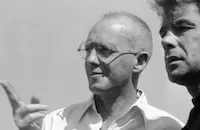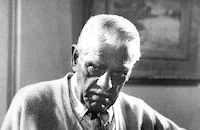West of Shanghai

Brief Synopsis
Cast & Crew
John Farrow
Boris Karloff
Beverly Roberts
Ricardo Cortez
Gordon Oliver
Sheila Bromley
Film Details
Technical Specs

Synopsis
Businessmen Gordon Creed and Myron Galt and Galt's daughter Lola are all on a train bound for north China where bandit Wu Yen Fang is threatening the populace. Although the apparent purpose of Gordon's trip is a visit to his estranged wife Jane, who is working as a medical missionary, his ulterior motive is to become a partner in Jim Hallet's oil fields. Galt is also traveling to the oil fields. He loaned Jim the money to begin drilling, and as Jim defaulted on the loan, Galt intends to take over the fields. During their trip, General Chow Fu-Shan, a soldier fighting the bandits, is killed, and the three Americans are questioned by the police before they set off by mule train for the north. Jim meets them and directs them to the medical mission, as Fang is dangerously active further north. No sooner have they arrived at the mission, where it is apparent that Jane and Jim are in love, than Fang attacks. Out of gratitude to Jim for having once saved his life, Fang tries to solve Jim's problems. After putting down a rebellion fomented by Gordon, Fang kills him. A spy alerts Chinese troops to Fang's presence at the mission, and during the ensuing battle, Fang surrenders to the soldiers and is executed. Now that Gordon is dead, Jane is free to marry Jim.

Director

John Farrow
Cast

Boris Karloff
Beverly Roberts

Ricardo Cortez

Gordon Oliver
Sheila Bromley
Gordon Hart

Richard Loo
Chester Gan
Luke Chan
Selmer Jackson
James B. Leong
Tetsu Komai
Eddie Lee
Maurice Liu
Mia Ichioka
Douglas Wood
Paul Fung
Frank Tang
Bruce Wong
Sam Tong
Tom Ung
Daro Meya
Crew

Film Details
Technical Specs

Articles
West of Shanghai
The plot follows two American financiers (Ricardo Cortez and Douglas Wood) who travel to China to foreclose on another American's oilfield (he also happens to live and work with Cortez's wife). But when they arrive, they discover the area overrun with bandits and are themselves taken hostage in a local mission by Gen. Fang and his brutal gang. Fang, however, is a man of high principles, and while keeping the Americans captive, he takes a great interest in resolving a romantic triangle that has developed.
Despite the unusual setting, the character of Gen. Fang was in many ways a typical one for Karloff; he had already played an Oriental villain in The Mask of Fu Manchu (1932) but this time, his character was more enigmatic. On the surface he appeared ruthless and cruel, but underneath, he was good-natured and noble. And on top of this compelling portrayal, Karloff found much subtle humor in the role, often underplaying - even deadpanning - to wonderful effect. At one point, for example, he tells Gordon Oliver, "I'm sorry, my friend. In one hour you die. But I not let you die alone. I come watch." Fang often refers to himself in the third person and reveals an enormous ego, but Karloff found a way to make it almost an endearing trait.
Physically, Karloff is at first glance unrecognizable in his Oriental makeup. The actor later remembered that the makeup for Fang was harder to apply than it was for Frankenstein's monster - though it was more comfortable.
Director John Farrow, husband of actress Maureen O'Sullivan and father of Mia Farrow, directed Karloff again the following year in The Invisible Menace (1938), and went on to direct such classic film noirs as The Big Clock (1948), Where Danger Lives (1950), and His Kind of Woman (1951).
Producer: Bryan Foy, Hal B. Wallis, Jack L. Warner
Director: John Farrow
Screenplay: Porter Emerson Browne (play), Crane Wilbur
Cinematography: L. William O'Connell
Film Editing: Frank DeWar
Art Direction: Max Parker
Music: Heinz Roemheld
Cast: Boris Karloff (General Wu Yen Fang), Beverly Roberts (Jane Creed), Ricardo Cortez (Gordon Creed), Gordon Oliver (Jim Hallet), Sheila Bromley (Lola Galt), Vladimir Sokoloff (General Chow Fu-Shan).
BW-65m.
by Jeremy Arnold

West of Shanghai
Quotes
Trivia
The original play opened in New York on 30 September 1920.
Notes
The film's pre-release titles were: Warlord, China Bandit, The Adventures of Chang and Cornered. Several trade papers reviewed the picture as Warlord. Porter Emerson Browne and Charles Hanson Towne wrote a novel entitled The Bad Man (New York, 1921). Only the play is credited onscreen. The original play was set in Mexico. Other films based on the same play included The Bad Man, a 1923 First National film directed by Edwin Carewe and starring Holbrook Blinn (who also starred in the stage production), and a 1930 film of the same title directed by Clarence Badger and starring Walter Huston (see ;AFI Catalog of Feature Films, 1921-30; F2.0237 and F2.0238). In 1941, M-G-M made a version entitled The Bad Man, starring Wallace Beery and Ronald Reagan and directed by Richard Thorpe.















